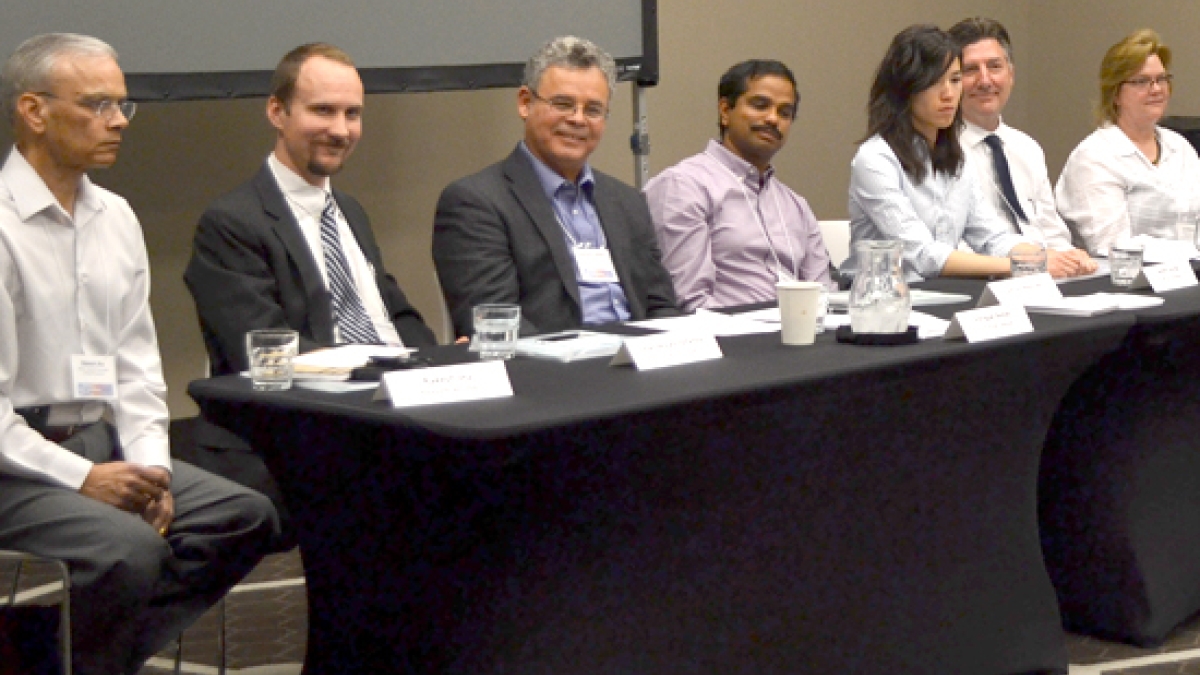Industry experts offer 7 tips to help students land jobs

According to a panel of experts from Honeywell Aerospace, Intel Corporation and others, communication skills are essential for preparing for a career in industry.
The experts visited Arizona State University to participate in a wide-ranging discussion as part of the Postdoc Best Practices Arizona conference. They revealed insider tips important for all students and graduates – not just postdocs – and those looking to land their dream job.
“Industry is looking for new ideas,” said Jason Smith, engineering manager of the Unmanned Systems Integration Center at Northrup Grumman Corporation. “We want to recruit more job candidates at all levels of education because in order to survive, we have to have new ideas coming into the company.”
Other tips included:
1. Develop a “t-shaped” profile
As described by Enrique Aviles, chief technology officer at Critical Path Institute, a “t-shaped” profile requires deep expertise in your field, but with a broad ability to communicate with a team of diverse backgrounds and disciplines, from engineering to biology to computer science.
“You bring to the table an expertise that the person next to you might not have,” says Lia Walker, an operational improvement-global quality leader at Freeport McMoRan Copper & Gold. She states that a scientist or engineer will need to communicate with technicians or other front line people on a “rubber-meets-the-road level.”
2. Learn to think in terms of product creation rather than pure research
Developing real-world solutions to problems is the goal of industry. “A true R&D effort should yield something tangible, an actual product, a patent, some sort of intellectual property that the corporation can then use to solve a problem it has been faced with, such as aviation safety,” said Smith. “In the end we’re here to make money. The product should be something that drives value back to our organization.”
Panelists also valued an entrepreneurial mindset, which can result from additional training in entrepreneurship and innovation at ASU.
3. Network
Meet people and make connections that can be important to your future career. In addition to national professional society meetings and national conferences, attend any event where industry experts are present.
Don’t just listen, actively participate, talk to people personally and ask questions. “Networking takes time, but it begins to build,” said Rakesh Jha, director of Advanced Technology for Crew Interface and Platform Systems at Honeywell Aerospace. “Don’t be shy – be shameless. You’ve got nothing to lose by talking to people.”
4. Hone your “elevator speech”
“At any point in time, you should be prepared to give your elevator speech,” says Aviles. The ability to describe your research or your product in two to three sentences is a critical communication skill, agreed other experts. Speaking to all the great technology features of a product is less important than communicating the value your work has to a potential client, or describing how it solves a specific problem.
5. Cast a wide net when you apply for a job
Panelists agreed that you need to cast a wide net in searching for a job. Job postings are only the beginning of a search. Although your skillsets or background may not exactly match those on a job description, most panelists urged applying anyway.
“Expand your cover letter and describe what you can do for the company,” said Smith. “Sometimes I get 30 to 40 applications for a particular position, but a cover letter may be so impressive that I may hire that person even if their resume isn’t exactly the skillset I am looking for.”
“When you are looking at a posting, don’t self-select,” said Sarah Leung, an aortic product specialist at WL Gore & Associates, Inc. “Don’t be the one to tell yourself that you are not qualified for that position.”
6. Consider an internship
“We have internships for undergraduates, graduate students and postdocs,” said Smith. Interns may research a specific problem rather than developing a product.
“Internships, even if they don’t work out to a full-time job, are a very valuable experience,” said Aviles. “It looks good on your resume and now you are a more competitive candidate than someone who doesn’t have that experience.”
7. Build additional skills
Demonstrated abilities in proposal writing, fundraising such as grants, and leadership abilities such as managing a lab or mentoring other students are other important abilities.
“Publications in high quality journals as well as patents indicate very important skillsets,” said Sanjay Addicam, a senior staff software engineer at Intel Corporation.
Aviles also mentioned the “need to get ahead of this avalanche of data that is coming at us.” Faster pattern recognition in data, which can be supplied by mathematicians and computer scientists, are also urgently needed skills.
The conference was sponsored by the ASU School of Computing, Informatics and Decision Systems Engineering; Science Foundation Arizona; and ASU Graduate Education. Funding for the grant was provided by the National Science Foundation through the Computing Research Association.
The conference was moderated by Anita Jones from the University of Virginia, who has formerly served as director of Defense Research and Engineering for the Department of Defense, and as vice-chair of the National Science Board; Sethuraman “Panch” Panchanathan, senior vice president of ASU's Office of Knowledge Enterprise Development, foundation chair in Computing and Informatics, and director of the Center for Cognitive Ubiquitous Computing (CUbiC); and Chitta Baral, an ASU professor in the School of Computing and Informatics.

